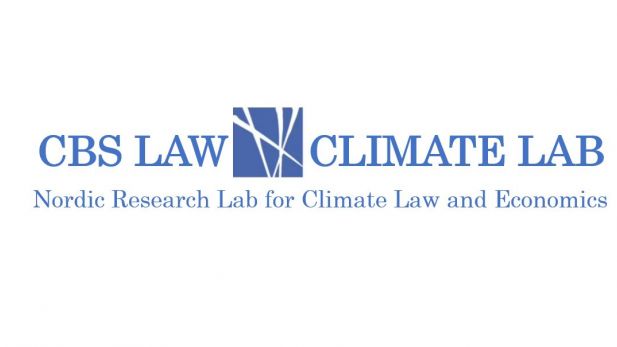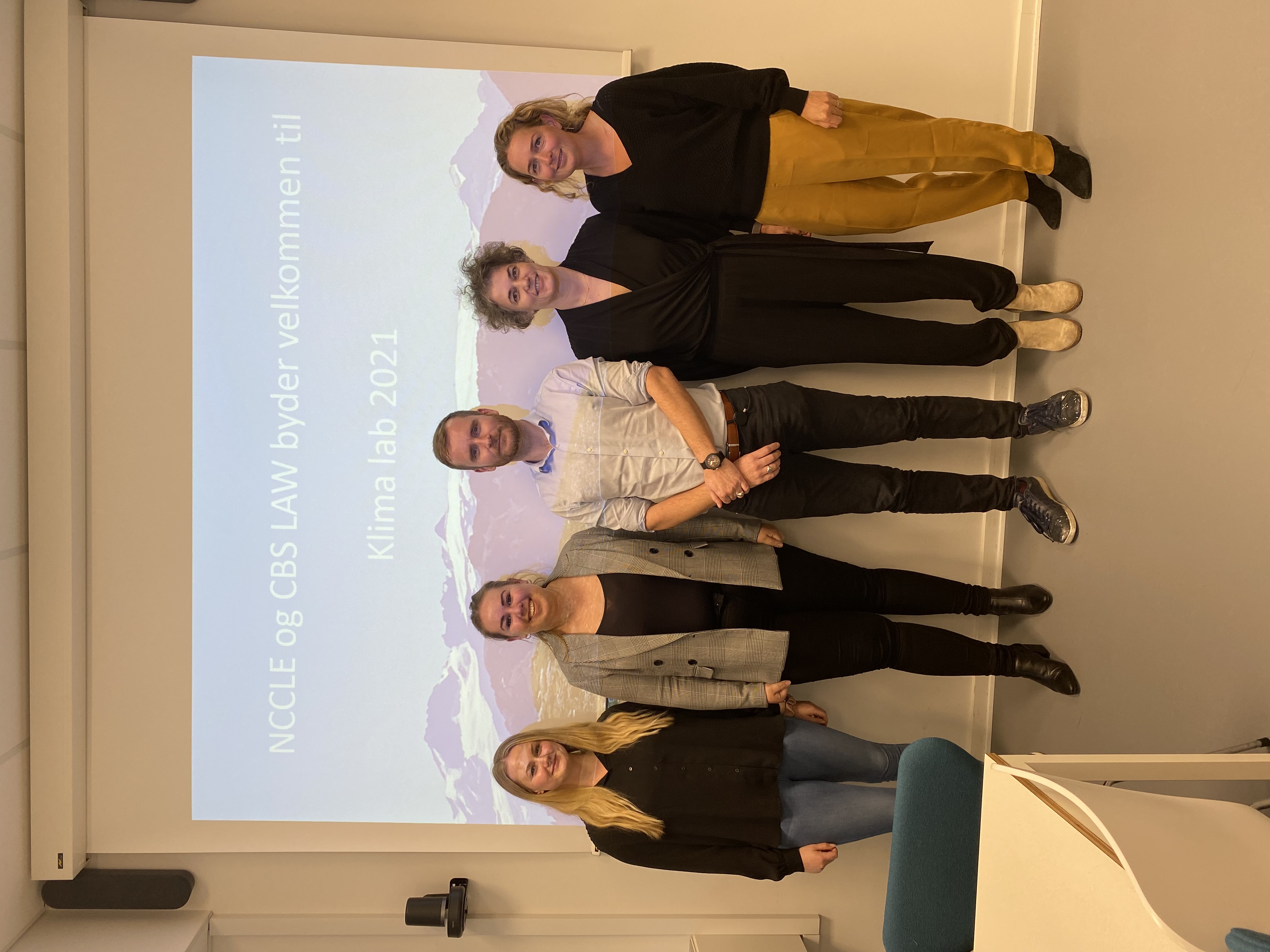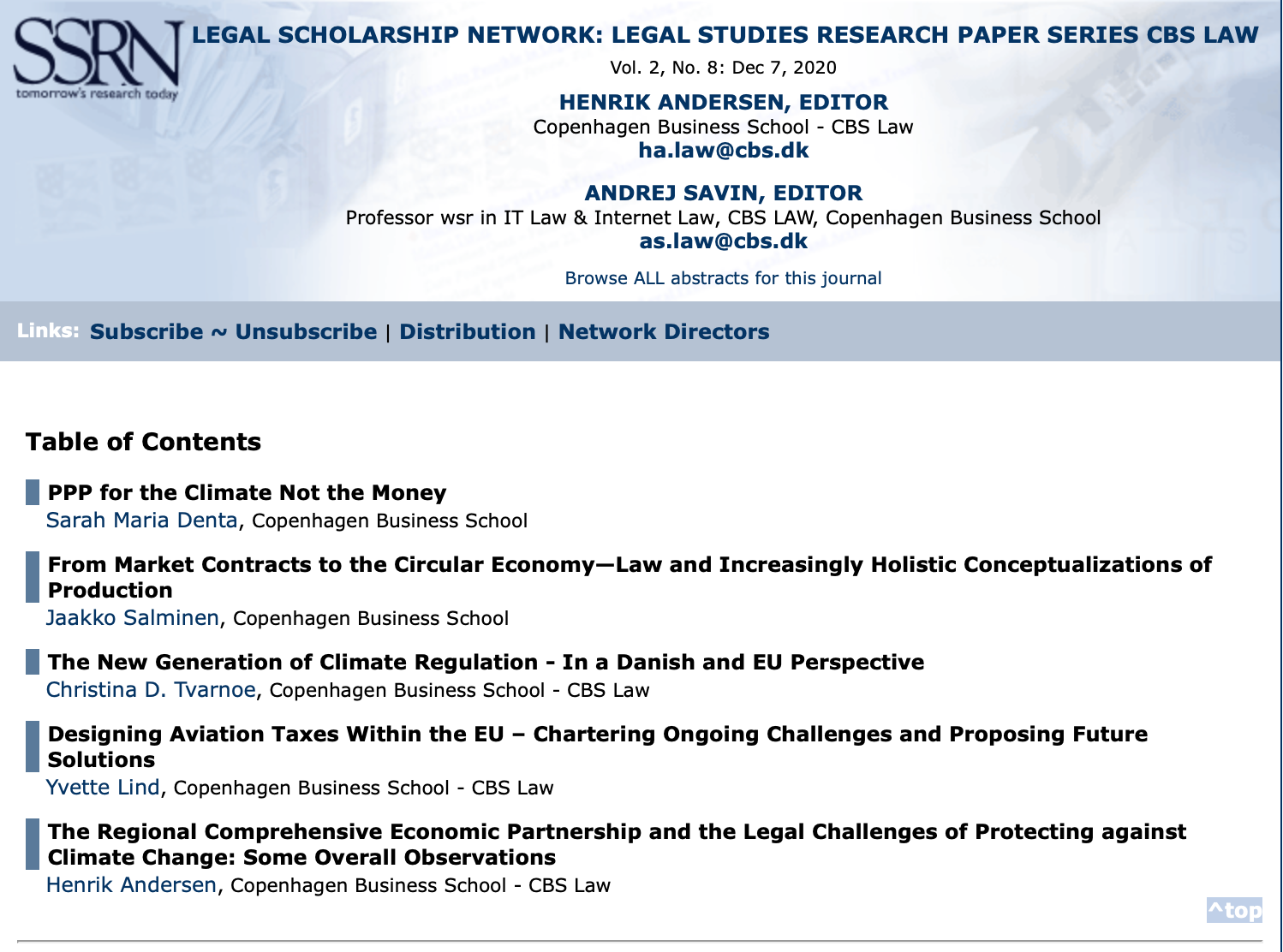CBS LAW
Climate Law and Economics

The present group members are
Associate Professor Henrik Andersen
Associate Professor Marie-Louise Holle
Assistant Professor Sarah Maria Denta
Assistant Professor Jaakko Salminen
PhD Fellow Amalie Toft Bentsen
PhD Fellow Frederik Skamris Holm
Associate Professor Kalle Johannes Rose
The purpose of the climate law and economics research group
The purpose of the research group is to establish a strong group of researchers that can provide research in climate law in a Danish, EU, international and economic perspective.
CBS LAW is a significant legal environment for combining business law and economics and has several researchers within this field. This group of researchers has previously focussed on public private law, EU law, international law and WTO in an economic perspective. The starting point of the climate research to be conducted is how collaboration between the public sector and the private industry can provide relevant and innovative solutions to the climate change and global warming.
Climate law news from NRLCLE
- Associate professor Marie-Louise Holle has recently joined The Sabin Center for Climate Change Law Peer Review Network. Her research in climate litigation is a continuation of her long research in liability, torts and litigation. She is a Sabin Center rapporteur for four jurisdictions, French as well as English speaking (Madagascar, Monaco, Namibia and the Seychelles). She has also joined the Sabin Center’s research group for corporate liability and climate change. See further: Marie-Louise Holle | Sabin Center for Climate Change Law (columbia.edu) and : Sabin Center for Climate Change Law (columbia.edu): The Sabin Center for Climate Change Law at Columbia Law School develops and promulgates legal techniques to address climate change and trains the next generation of lawyers who will be leaders in the field. The Sabin Center is an affiliate of the Earth Institute and the Columbia Climate School and are a partner to and a resource for public interest legal institutions engaged in climate change work. The Center’s activities are spearheaded by Michael Gerrard, Faculty Director and Andrew Sabin Professor of Professional Practice at Columbia Law School, and Michael Burger, Executive Director and Senior Research Scholar at Columbia Law School. The Center’s thought leadership and direct engagement operate at the international, national, state and local levels.
- Professor Christina D. Tvarnø has from May 2023 been appointed to an expert panel supporting the he national energy crisis staff, NEKST, under the Danish Ministry of climate, energy and supply. NEKST will investigate and coordinate the climate challenges in society and identifying barriers and finding solutions, initially, green heat production and expansion of renewable energy on land.
Climate law arises from the UN conventions, protocols and agreements.
The United Nations Framework Convention on Climate Change entered into force on 21 March 1994 and 197 countries that have ratified the Convention. The UNFCCC is known as the “Rio Convention”, negotiated at the “Rio Earth Summit” in 1992. Two other UN conventions were negotiated at the same summit; the UN Convention on Biological Diversity; and the Convention to Combat Desertification. Legislation is the key instrument in the Rio Convention (UNFCCC) as stated in the preamble. The countries should ”enact effective environmental legislation, that environmental standards, management objectives and priorities should reflect the environmental and developmental context to which they apply, and that standards applied by some countries may be inappropriate and of unwarranted economic and social cost to other countries, in particular developing countries”. Consequently, legal studies on climate law are of high significance.
The Kyoto Protocol was adopted on 11 December 1997 and entered into force in 2005. Currently, there are 192 Parties to the Kyoto Protocol which makes the Kyoto Protocol key legal instrument worldwide. The purpose of the Kyoto Protocol is to operationalizes the principles from UNFCCC by committing industrialized countries to limit and reduce greenhouse gases emissions in accordance with agreed individual targets. Hence, the Kyoto Protocol is based on the principles of the UNFCCC. It binds the developed countries with the principle of “common but differentiated responsibility and respective capabilities.” The Kyoto Protocol introduced a flexible market mechanism, building on the trade of emissions permits which means that the countries must meet their targets through either national measures or through 1) International Emissions Trading; 2) The Clean Development Mechanism, or 3) Joint Implementation.
At COP 21 in Paris, on 12 December 2015, the countries of the UNFCCC agreed to accelerate and intensify the actions and investments needed for a sustainable low-carbon future. The Paris Agreement builds upon the UNFCCC and provides common cause to undertake ambitious efforts to combat climate change and adapt to its effects, and to assist developing countries. 187 countries have ratified the agreement. The Paris Agreement entered into force in 2016. Legislation is a key element in the Paris Agreement. The Paris Agreement itself does not consist of binding legislation but in the preamble the importance of the engagements of all levels of government and various actors, in accordance with respective national legislations in addressing climate change is emphasised. The Paris Agreement’s key purpose is stated in article 2 due to which, the aims of the Paris Agreement is to strengthen the global response to the threat of climate change, in the context of sustainable development and efforts to eradicate poverty. The purpose should due to article 2 be followed by:
Holding the increase in the global average temperature to well below 2°C above pre-industrial levels and pursuing efforts to limit the temperature increase to 1.5°C above pre-industrial levels, recognizing that this would significantly reduce the risks and impacts of climate change; (b) Increasing the ability to adapt to the adverse impacts of climate change and foster climate resilience and low greenhouse gas emissions development, in a manner that does not threaten food production; and (c) Making finance flows consistent with a pathway towards low greenhouse gas emissions and climate-resilient development.
The Paris Agreement does not provide negotiated binding national targets and common legislation. All measures and provisions regulating the effort are on a national legal level.
Further climate law research is necessary
The CBS LAW climate law and economics research group will provide relevant legal research on an international, EU, and national level and will provide relevant knowledge on how to establish and develop collaboration among public and private parties. The law, the economics and collaboration will be key elements in the future climate change development and thus CBS LAW will contribute to the future global climate research environment.
Climate law and economics events
The CBS LAW climate law and economics research group will present online climate law and economics seminars during the fall 2020 and plan on hosting a climate law and economics conference in 2021.
The researchers of the CBS LAW climate law and economics group have written the following papers and articles on climate law and economics and more is to come during the next months.
Climate Law Talks
In October 2023, lawyer Caroline Glyager invited Professor Kim Østergaard to a discussion on what conflicts there are between ESG as a legal discipline and its interaction with contract law in the podcast series ESG-eksperterne: https://podcasts.apple.com/dk/podcast/esg-eksperterne/id1705740561?i=1000630232844.
On 21 September 2023, Associate Professor Henrik Andersen addressed the environmental group of the Association of European Administrative Judges at their annual conference in Nancy, France, with a presentation titled 'Climate Justice and the Rule of Law.'
On 1 September 2023, Professor Christina D. Tvarnø participated in a panel at the Danish climate summit in Middelfart concerning Loss and Damage in the international climate law. The panel was arranged by Oxfam.
In September, Associate professor Marie-Louise Holle gave a presentation at the University of Copenhagen at the Center for International Law and Governance, on Climate Litigation and Private Law: Protecting Rights and Preventing Damage in the Face of Climate Change. Link here.
In July, Associate professor Marie-Louise Holle presented a paper at the Obligations X Conference on Public policy and private law. The bi-annual conference is the most important conference in its area in the English-speaking world, and the paper selection process is highly competetive. The conference was held in Banff (Alberta, Candada). Link here.
In May, Associate professor Marie-Louise Holle gave a presentation on climate litigation to Copenhagen Disputes Circle. Holle also participated in the subsequent panel debate with Will Hooker, attorney for Client Earth, Pallas London LLP, and Jonas Christoffersen, attorney. The conference was held at Kammeradvokaten, one of the leading Danish law firms and advisor to the Danish government.
On 16 May, Professor Christina D. Tvarnø participated in the radio show Guld og Grønne Skove on the radio channel P1 in which she explained the rules in the Danish Climate Act and the reduction targets for CO2e in 2025 and 2030. The full interview can be accessed here.
Christina D. Tvarnø presented her research on calculating climate data in a Danish, EU and UN law perspective on the CONNOR 2030 Workshop – Constitutionalism in the Nordics:
Climate Change and Constitutional Law at the law faculty of Lunds University September 2, 2022.
Henrik Andersen was interviewed by the Danish online news media Verdens Bedste Nyheder about a new tendency in climate activism throughout the world in which it is possible for NGOs as well as private persons to sue governments succesfully regarding their lacking actions against climate change, e.g. in regard to the shared agreements of the Paris Agreement. The Danish article is available here.
Henrik Andersen was a co-organiser of the ELI conference on 'Climate Justice – New Challenges for Law and Judges', which took place on 7 July 2022 at University of Ferrara, Florence, Italy. Read more about the conference here.
See Jaakko Salminen’s latest climate-blog debate here:
“The Circular Economy and Legal Technique: Nothing new from a business perspective”: https://www.jus.uio.no/english/research/areas/companies/blog/futuring-sustainable-nordic-business-models/circular-economy-and%20legal-technique--samlinen.html.

In the fall 2021, the CBS LAW Climate research group (NRLCLE) held the first climate law lab with students from the CBS Business Law and Economics study program, researchers from CBS LAW, and external lecturers and climate law experts.
The CBS LAW researchers, CBS students and the external lecturers presented research results, bachelor projects and industry data. The CBS LAW climate law lab focuses on making collaboration between the Danish industry, academia and the students at CBS with the aim of establishing a forum for discussing the newest knowledge, data, challenges and opportunities in regard to climate law in Denmark. Some of the topics presented and discussed at this climate law lab concerned energy, compliance and plastic.
Jaakko Salminen presents his research: From Market Contracts to the Circular Economy: Law and Holistic Conceptualizations of Production At University of Oslo Department of Private Law 24 September 1500 CET.
See the selected research from the group members
Selected Publications
Christina D. Tvarnø. (2023). Tab og skader i den internationale klimaret, Tidsskrift for Miljø, 2023(10), 384-391. https://www.jurabibliotek.dk/view/journals/tfm/2023/10/article-p384.xml
Christina D. Tvarnø -- Klimaret - almindelig del. Djøf forlag. 2022.
- The book ’Klimaret – Almindelig del’ (EN: Climate Law -- in general) concerns general considerations on climate law from a Danish perspective as well as from the perspective of EU law and international law. The book was published on 26 August 2022 and is available at Djøf Forlag.
Christina D. Tvarnø – ‘The New Era of Climate Law in Denmark and in the EU’. In: European Public Law, Vol. 28, No. 1, 2.2022.
Christina D. Tvarnø & Sarah Maria Denta. (2022). "New frontiers of PPP law". In A Research Agenda for Public–Private Partnerships and the Governance of Infrastructure. Cheltenham, UK: Edward Elgar Publishing. doi: https://doi.org/10.4337/9781839105883.00019.
December 2021 publications from CBS LAW NRLCLE
- Sarah Maria Denta, European Procurement & Public Private Partnership Law Review, Vol. 16, Nr. 4, 2021, s. 318-328
- Christina D. Tvarnø, A (Non-) Net-zero Greenhouse Gases Emission Goal in the Danish Climate Act, Carbon & Climate Law Review, Vol. 15, Nr. 4, 2021, s. 342-248
- Jaakko Salminen; Mikko Rajavuori, Yritysten arvoketjupäästöjen hallinta, sääntely ja vastuu, Oikeus, Vol. 50, Nr. 4, 2021, s. 481–502
Previous Research:
Henrik Andersen, Climate Concerns and Antidumping Law : Where is the Space for the Climate Argument?., CBS LAW Research Paper, Nr. 21-09
Henrik Andersen, The EU-China Comprehensive Agreement on Investment (CAI) and Climate Protection : A Brief Descriptive Overview of CAI Climate Regulation and its Legal Context. CBS LAW Research Paper, Nr. 21-13
Henrik Andersen, WTO Panel and Appellate Body Jurisprudence on Environmental Protection of Marine Living Resources : Considerations for the Maritime Silk Road Shipping Policies, Comparative Law Yearbook of International Business. red. /Christian Campbell. Vol. 42A, Alphen aan den Rijn : Kluwer Law International 2021, s. 75-125
Jaakko Salminen; Mikko Rajavuori, Law, Agency and Sustainability : The Role of the Law Creating Sustainability, Research Handbook of Sustainability Agency. red. /Satu Teerikangas ; Tiina Onkila; Katariina Koistinen; Marileena Mäkelä. Cheltenham : Edward Elgar Publishing 2021, s. 322-334
Jaakko Salminen, Sustainability and the Contractual Organization of Production, The NOVA Knowledge Centre for Business, Human Rights and the Environment 20.4.2021
Tvarnø, Christina D., Climate Public Private Partnerships in the EU: European Procurement & Public Private Partnership Law Review. Volume 15, Issue 3 (2020) pp. 200 - 208
Tvarnø, Christina D., Regulating the Climate (February 27, 2020). Copenhagen Business School, CBS LAW Research Paper No. 20-01. Available at SSRN or here
Tvarnø, Christina D., EU Climate Law and Public Private Partnerships (April 29, 2020). Copenhagen Business School, CBS LAW Research Paper No. 20-06. Available at SSRN
Holle, Marie-Louise, & Amalie Bang, 'Making Legal History: State Liability for Negligence in Climate Change', (2020), 26, European Public Law, Issue 1, pp. 45-58. Available here
See also SSRN: Bang, Amalie and Holle, Marie-Louise, Making Legal History: State Liability for Negligence in Climate Change (February 24, 2019). Copenhagen Business School, CBS LAW Research Paper 19-11, Available at SSRN or here
Andersen, Henrik, WTO Jurisprudence on Protection of Marine Living Resources: Policy Considerations for the Chinese Belt and Road Initiative (May 16, 2019). Copenhagen Business School, CBS LAW Research Paper No. 19-20. Available at SSRN or here
The research group at CBS LAW, Nordic Center for Climate Law and Economics (NNCLE), proudly present our first joint SSRN Climate Law issue.
The issue illustrates the importance of climate law and economics research and showcases the research contribution from the CBS LAW climate law scholars:
From
Climate contracting through Public private partnerships or in the circular economy
To
Climate regulations, Climate taxes and the Legal challenges on climate protection
Further Research Needed
Henrik Andersen is project reporter on European Law Institute project: “Climate Justice – New Challenges for Law and Judges”
European Law Institute has initiated the project: “Climate Justice – New Challenges for Law and Judges”.
Associate Professor Henrik Andersen from CBS Law is one of the project reporters. The other project reporter is Professor Alberto De Franceschi from Ferrara University, Italy, and they have a strong project team of both academics and judges.
The project aims to develop Principles for Climate Justice that are workable in practice. The goal is to provide an overview of different sources of law that courts, in particular national courts in Europe and the Court of Justice of the European Union, may apply in questions relating to climate justice with particular focus on liability of States and companies in internal and transboundary situations.
See more about the project: https://www.europeanlawinstitute.eu/projects-publications/current-projects-upcoming-projects-and-other-activities/current-projects/climate-justice/
Get to know us and our climate research here.
